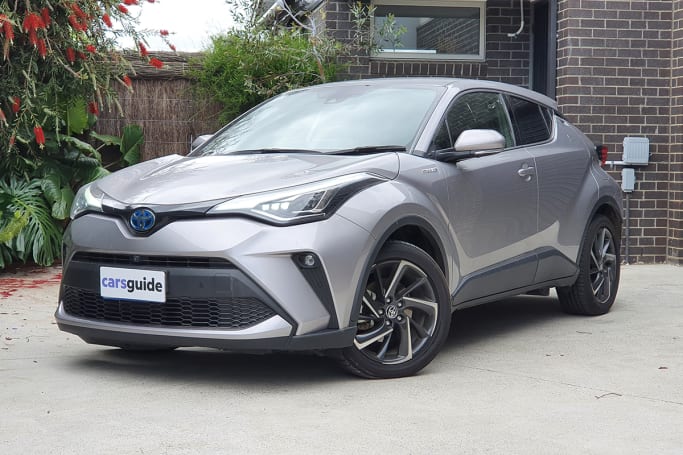
Holden class action! Holden Commodore, Colorado, Trailblazer, Caprice and more swept up in alleged faulty automatic transmission saga
Law firm Maurice Blackburn has launched a class action lawsuit against General...
Browse over 9,000 car reviews

The evolution of the small SUV has kicked off and is going full steam ahead!
In the space of 18 months, a whole swag of interesting and ultra-economical small SUVs and crossovers have launched in Australia, turning what was one of the thirstiest types of urban runabout into something far more fuel efficient.
Recently, we averaged just 4.1L/100km testing a Toyota Yaris Cross GX Hybrid 2WD in real-world everyday driving – when just a couple of years earlier, the similarly sized Holden Trax 1.8L Ecotec barely breached the 10L/100km mark. We shouldn’t speak ill of the dearly departed, but that sort of economy can cost you plenty over a few years.
But you might also be shocked to learn that some of the newest hybrids aren’t so good on petrol.
The head-turning Mazda MX-30 G20e mild-hybrid from $33,990 plus on-road costs, for instance, averages 6.4L/100km, while the $35,490 Subaru XV Hybrid sits at 6.5L/100km.
In the context of what a Yaris Cross Hybrid manages, these numbers aren’t great – especially when the significantly larger Toyota RAV4 GX 2WD hybrid mid-size SUV (from $37,070) returns a fit 4.7L/100km. It’s too big to make this list, by the way.
So, to save you money, time and disappointment, here’s the list of the most frugal small SUVs and crossovers under $40,000 available in Australia right now.
Remember, folks. The lower the numbers, the bigger the savings!

Predictably, the least expensive small SUV hybrid is from hybrid pioneer Toyota. It’s also downright the most frugal for under $40,000 – a remarkable achievement.
Based on the Japanese brand’s fourth-generation Yaris supermini but with a taller, wider and longer body liberating more space inside, the Yaris Cross version is actually $30 cheaper than the smaller and narrower B-segment hatchback with the same powertrain and running gear – by dint of the former being available in base GX grade while the latter starts off from mid-range SX guise.
And, you know what? The Yaris Cross GX Hybrid is so well equipped, it features everything you need in a high-rising compact urban runabout. Surely one of the great bargains of today.
Fuel consumption combined: 3.8L/100km
Recommended retail price: From $28,990

Newest kid on the small SUV block is the Kia Niro, available in hybrid, plug-in hybrid electric vehicle (PHEV) and pure EV. But it’s not so new.
Debuting overseas in 2016, the Niro is essentially a high-riding version of the Hyundai Ioniq, sharing many of its powertrains if not body parts, and comes with a unique personality to boot.
Key things to remember is that the petrol-electric hybrid version is designed to be a comfortable, roomy and very user-friendly compact family-car experience while being easy to drive and cheap to run.
Given its size, practicality and high levels of standard equipment, there’s plenty to like – but starting from $40K, it must compete against the cheaper and substantially larger Toyota RAV4 Hybrid.
Fuel consumption combined: 3.8L/100km
Recommended retail price: From $39,990

They may come from the same Toyota stable of SUVs, but the Yaris Cross and C-HR are very different animals.
Strikingly designed to look a bit like a sporty coupe with its hidden rear door handle, the C-HR is meant to make a style statement. Yet, being derived from the larger Corolla series, the cabin remains spacious as well as practical and well finished – though vision is limited in the roomy rear seat area.
Noticeably more powerful than the Yaris Cross’ equivalent, the hybrid version came on stream in late 2019, employing a smooth 1.8-litre four-cylinder petrol/electric powertrain to drive the front wheels.
Other distinguishing C-HR features include an advanced independent rear suspension system, for sophisticated road and handling.
Fuel consumption combined: 4.3L/100km
Recommended retail price: From $37,665

Standing taller than a Mazda CX-3, the cute and boxy Suzuki Ignis certainly fits the definition of a small SUV, though it really is best suited to the urban jungle.
Coming in at fourth place among our five most economical small SUVs under $40K, the cheapest GL starts at less than half that and achieves its remarkable fuel economy through lightweight engineering, rather than any sophisticated electrification.
The 4.7L/100km figure is for the five-speed manual, but the optional auto Ignis for just $1000 more still scapes in under 5.0L/100km, making it the ideal frugal commuter for those on a budget. The Ignis rides a bit stiffly and can get noisy at times, but it’s also a charming and fun urban runabout.
Fuel consumption combined: 4.7L/100km
Recommended retail price: From $18,740

Our fifth most economical small SUV is another non-hybrid, the Skoda Kamiq 85TSI from the Czech Republic.
Related to the Volkswagen T-Cross, this handsome and beautifully packaged crossover has already made its mark in Australia, with plenty of standard features and lots of likeable little details to set it apart from the pack. An 85kW/200Nm 1.0-litre three-pot turbo petrol engine drives the front wheels via a seven-speed dual-clutch transmission.
You can also save yourself $2000 and go for the sweet-shifting six-speed manual from $28,990, though you’ll use an extra 0.1L/100km on average doing so, according to the official figures. One of the Kamiq’s few downsides is its preference for more-expensive premium unleaded petrol.
Otherwise, this Skoda’s a winner.
Fuel consumption combined: 5.0L/100km
Recommended retail price: From $30,990
Comments